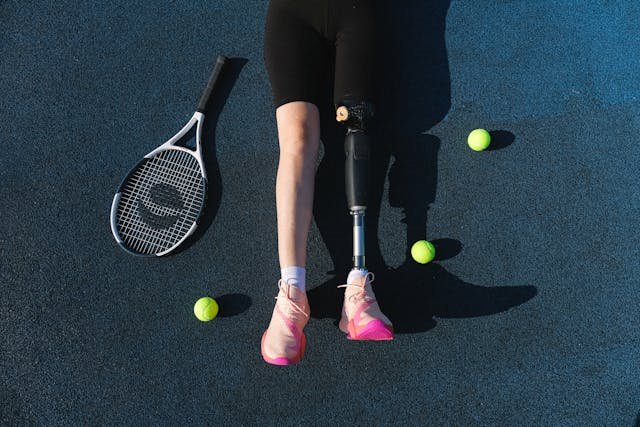For children with prosthetic limbs, movement is more than just physical—it’s about freedom, confidence, and self-expression. While everyday activities help build basic mobility skills, adaptive sports take it to a whole new level. These specially designed sports allow children with limb differences to run, jump, swim, and play competitively, just like their peers.
Participating in adaptive sports not only improves physical strength and coordination but also helps children develop self-esteem, resilience, and a strong sense of independence. Whether it’s running with a prosthetic blade, playing wheelchair basketball, or swimming with a waterproof limb, the benefits of adaptive sports go far beyond the game.
In this article, we explore how adaptive sports help children with prosthetics gain confidence, improve social skills, and embrace their full potential.
How Adaptive Sports Improve Self-Confidence
For many children with prosthetics, the fear of not being able to move as freely as others can hold them back. Adaptive sports break this barrier by showing them that they can run, play, and compete, just like any other child. Through specialized training and adaptive equipment, children discover that their prosthetic is not a limitation but a tool for empowerment.
Overcoming Physical Barriers and Building Strength
As they practice and improve their balance, coordination, and endurance, they start to feel more in control of their bodies. This sense of mastery boosts confidence, helping them feel capable and strong in both sports and daily life.
Physical activity also releases endorphins, the “feel-good” hormones, which reduce stress and increase happiness. When children engage in adaptive sports, they experience joy, excitement, and a deep sense of achievement, reinforcing their belief in their abilities.
Learning to Overcome Challenges and Set Goals
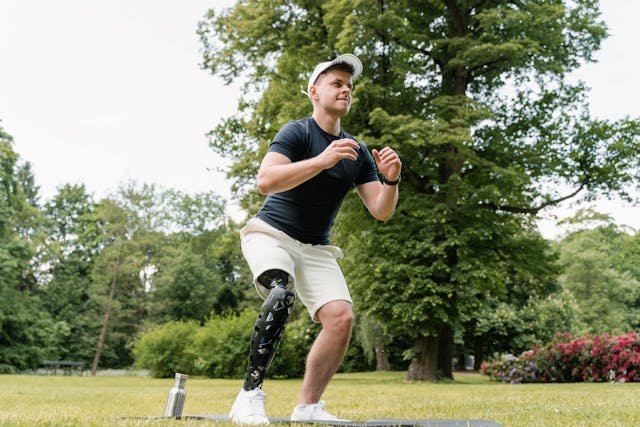
Every child faces challenges when learning a new sport, but for children with prosthetic limbs, the obstacles can feel even greater. However, adaptive sports provide a safe space where they can push their limits, try new techniques, and celebrate small victories.
The process of setting goals—whether it’s learning to kick a ball, running a certain distance, or mastering a new movement—teaches children patience, discipline, and perseverance. Each milestone they achieve reinforces their confidence and proves that they are capable of more than they imagined.
Coaches and mentors play a crucial role in this process, encouraging children to keep trying, even when things get difficult. This mindset extends beyond sports, helping them face life’s challenges with a positive, determined attitude.
Transforming Self-Perception from “Different” to “Empowered”
One of the biggest emotional struggles children with prosthetics face is feeling different from their peers. Adaptive sports change this narrative by placing them in an environment where they are not defined by their limb difference, but by their abilities.
As they train, compete, and excel in their sport, children begin to see themselves as athletes rather than individuals with disabilities. This shift in self-perception is incredibly powerful—it teaches them that their prosthetic does not limit their potential but instead gives them the tools to succeed.
This newfound confidence extends into school, friendships, and other areas of life, helping them interact more comfortably and engage in more activities without hesitation.
Building Social Connections Through Team Sports
Sports naturally bring people together, and adaptive sports create a sense of belonging for children with prosthetics. Being part of a team or training group allows them to connect with other kids who share similar experiences and challenges.
Forming Friendships with Other Athletes
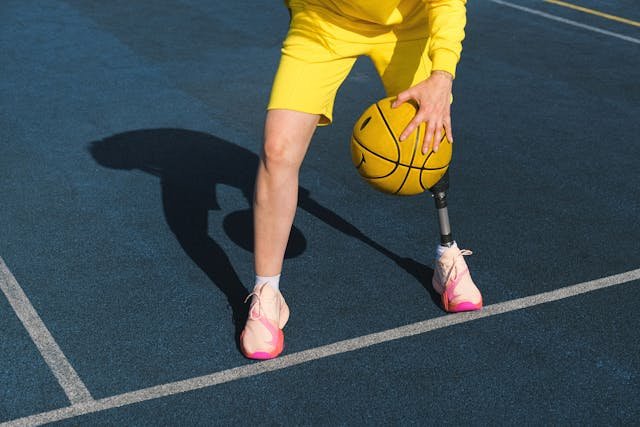
These friendships provide emotional support, encouragement, and motivation, helping children feel understood and accepted. Knowing that others have gone through similar struggles reduces feelings of isolation and builds strong, lifelong bonds.
Through shared victories and challenges, children learn the value of teamwork, communication, and mutual respect. These social skills help them interact more confidently in other areas of life, such as school and social gatherings.
Reducing Feelings of Isolation and Encouraging Inclusion
Many children with prosthetic limbs struggle with feeling left out of activities at school or in their communities. Adaptive sports create inclusive spaces where every child has an equal opportunity to participate and shine.
Schools and local sports organizations that offer adaptive programs help bridge the gap between children with and without limb differences. When all children, regardless of ability, can play together and learn from each other, it fosters acceptance, understanding, and inclusivity.
By participating in adaptive sports, children gain the confidence to join mainstream activities, knowing that they have the skills and abilities to keep up with their peers.
Learning Valuable Social Skills Through Competition
Competitive sports teach essential life skills such as sportsmanship, resilience, and leadership. Whether winning or losing, children learn how to handle challenges, setbacks, and victories with grace.
Being part of a competitive sports environment helps children develop communication skills, as they learn to express themselves, listen to teammates, and take direction from coaches. These interactions build confidence and social awareness, making it easier for them to engage in everyday conversations and activities.
The Role of Coaches and Mentors in Boosting Confidence
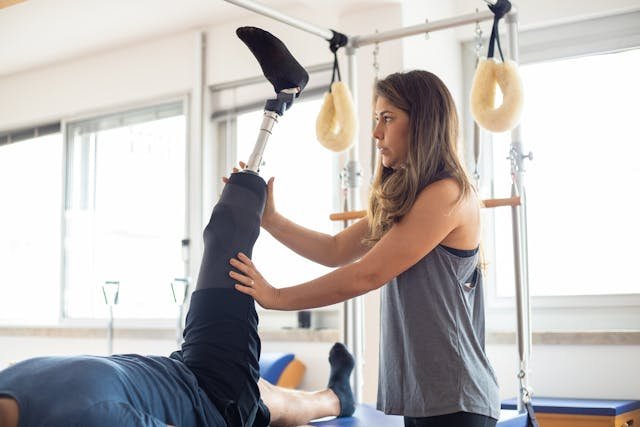
A great coach does more than teach sports skills—they instill confidence, motivation, and a belief in one’s abilities. Coaches in adaptive sports programs understand the unique challenges children with prosthetics face and help them see what they can achieve, rather than what they can’t.
Encouraging a Positive Mindset and Self-Belief
By providing consistent encouragement and constructive feedback, coaches help children push past doubts and recognize their strengths. A simple “You did great today!” or “You’re getting stronger every day!” can make a world of difference in a child’s confidence.
Having a mentor who believes in them helps children develop a positive attitude toward challenges, making them more willing to try new things and step out of their comfort zone.
Teaching Adaptation and Problem-Solving
Adaptive sports involve modifying techniques, strategies, and movements to suit a child’s unique abilities. Coaches teach children how to adjust and adapt when faced with difficulties, helping them develop strong problem-solving skills.
For example, a child learning to kick a ball with a prosthetic leg may need to experiment with different angles and foot positions. A coach provides guidance and helps the child find the method that works best for them, teaching them resilience and adaptability.
These problem-solving skills extend beyond sports, giving children the confidence to tackle everyday challenges in school, social situations, and personal development.
Providing Role Models for Future Success
Many adaptive sports programs are led by athletes with prosthetic limbs who serve as role models and sources of inspiration. Seeing someone who has overcome similar challenges and achieved success motivates children to believe in their own potential.
These mentors help children set higher goals, develop a strong work ethic, and dream big, knowing that they too can succeed in sports and beyond. Whether it’s a coach, a Paralympic athlete, or an older teammate, having role models to look up to can spark ambition and lifelong confidence.
Types of Adaptive Sports for Children with Prosthetics
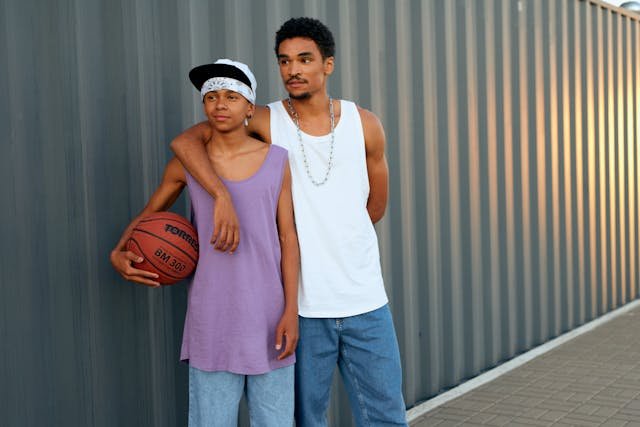
Running is one of the most popular adaptive sports for children with prosthetic limbs. With prosthetic running blades, kids can build speed, endurance, and confidence, competing in races and track events just like their peers.
Running and Track Events: Speed, Endurance, and Agility
Many children who start with basic walking prosthetics transition to running blades as they become more active. These specialized prosthetics provide shock absorption and energy return, helping kids move naturally and efficiently.
Participating in track and field events, such as sprints, long-distance running, and hurdles, helps children develop balance, coordination, and strength. Whether they run recreationally or competitively, they experience the thrill of movement and the joy of achievement.
Swimming: Strength and Independence in the Water
Swimming is a fantastic sport for children with prosthetic limbs because it reduces the impact on joints while allowing full-body movement. Many prosthetic users prefer swimming because water provides natural support, making it easier to move freely.
Some children swim with specialized waterproof prosthetics, while others prefer swimming without a prosthetic limb. Either way, swimming builds upper-body strength, improves cardiovascular fitness, and enhances coordination.
Being in the water also gives children a sense of freedom, as they don’t have to rely on their prosthetic limb for mobility. This increases self-confidence and encourages them to explore their physical capabilities.
Team Sports: Basketball, Soccer, and More
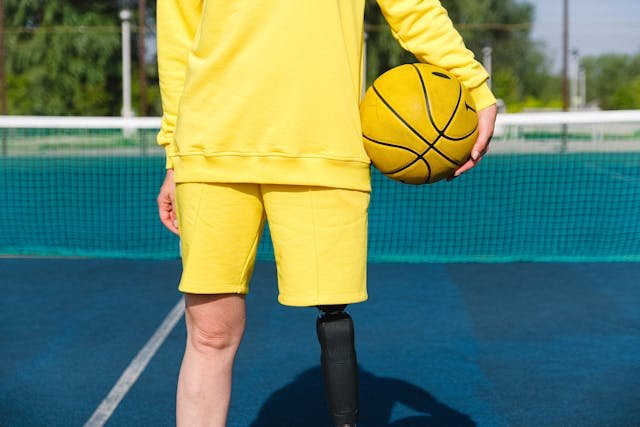
Team sports such as basketball, soccer, and cricket are great for children who enjoy camaraderie and competition. Adaptive sports programs modify these games so that children with prosthetics can fully participate, whether by adjusting the rules, using specialized equipment, or providing extra training.
Playing on a team teaches teamwork, communication, and leadership skills, helping children feel more comfortable in group settings. It also reduces self-consciousness, as they learn to focus on their skills rather than their limb difference.
For children interested in competitive sports, many national and international organizations, including the Paralympics and local adaptive sports leagues, offer structured programs where young athletes can train, compete, and showcase their talent.
Adventure Sports: Climbing, Skiing, and Cycling
Some children seek thrill and adventure, and adaptive sports allow them to push their boundaries in exciting ways. Activities such as rock climbing, adaptive skiing, and cycling provide a unique sense of achievement and boost self-confidence.
With advancements in prosthetic technology, children with limb differences can now participate in mountain biking, trekking, and even water sports like kayaking. These sports encourage resilience, problem-solving, and independence, helping kids develop a strong mindset both on and off the field.
How to Get Started with Adaptive Sports
One of the first steps in getting a child involved in adaptive sports is finding local programs and sports clubs that offer inclusive activities. Many organizations specialize in adaptive sports and provide trained coaches, specialized equipment, and a supportive community.
Finding Local Adaptive Sports Programs

Parents can start by checking with schools, rehabilitation centers, prosthetic clinics, and sports organizations. Many cities have adaptive sports clubs, and some schools integrate inclusive physical education programs for children with prosthetics.
If local programs are not available, online resources and virtual coaching sessions can also provide training tips and mentorship from professional adaptive athletes.
Choosing the Right Prosthetic for the Sport
Not all prosthetics are designed for sports, so choosing the right one is essential. Some prosthetics focus on walking and daily activities, while others are built for high-impact sports and specialized movements.
For example, running blades offer energy return and flexibility, while swimming prosthetics are waterproof and lightweight. Consulting with a prosthetist who specializes in sports prosthetics can help families select the best option for their child’s needs.
Children should also be involved in the selection process, as feeling comfortable and confident in their prosthetic is key to enjoying sports.
Encouraging Practice and Setting Goals
Once a child starts an adaptive sport, consistent practice is important. Setting small, achievable goals helps children track their progress and stay motivated.
Whether it’s running a certain distance, scoring a goal, or improving swimming technique, every accomplishment builds confidence. Parents and coaches should celebrate progress, no matter how small, as it reinforces self-belief and resilience.
The Role of Parents in Supporting Their Child’s Athletic Journey
Parents play a crucial role in shaping a child’s confidence, and their encouragement can make all the difference. Children may experience self-doubt or hesitation, especially when starting a new sport, but having supportive parents helps them stay motivated.
Encouraging a Positive Mindset and Self-Belief

Simple actions like attending practices, cheering from the sidelines, and reminding them of their progress help children feel valued and capable. Parents should also encourage a growth mindset, teaching kids that improvement takes time and effort.
When children feel supported at home, they are more likely to push past challenges and stay committed to their sport.
Helping Children Overcome Fear and Self-Consciousness
Some children with prosthetic limbs may feel shy or self-conscious about participating in sports, especially in new environments. Parents can help by discussing their child’s feelings openly and addressing any concerns they have.
If a child is nervous, introducing them to stories of successful adaptive athletes can inspire them to see what’s possible. Watching videos of Paralympic athletes or attending live adaptive sports events can also help them feel more excited and confident about joining in.
Encouraging children to focus on their abilities rather than their differences helps them see sports as an opportunity to have fun, learn, and grow, rather than something intimidating.
Advocating for More Inclusive Sports Opportunities
Parents can also play a role in making sports more inclusive by advocating for better adaptive sports programs in schools and communities. If a school does not offer inclusive physical education programs, parents can work with administrators to introduce adaptive options.
Organizing awareness events, fundraising for sports prosthetics, or connecting with local adaptive sports organizations can help ensure that more children have access to these life-changing opportunities.
The more inclusive the environment, the more confident and empowered children with prosthetics will feel in pursuing their passion for sports.
Final Thoughts: Helping Children Embrace Their Strength Through Sports
Adaptive sports do more than just improve physical abilities—they empower children with prosthetic limbs to believe in themselves, connect with others, and embrace their full potential. Through sports, children learn that they are not limited by their prosthetic but strengthened by it.
By providing opportunities for growth, social connection, and confidence-building, adaptive sports shape strong, independent, and resilient individuals. Whether a child dreams of competing in the Paralympics or simply playing for fun, sports offer them the chance to thrive.
At Robobionics, we are committed to helping children access high-quality prosthetics that support their active lifestyles. If your child is interested in sports, but their prosthetic is limiting them, contact us today. We can help them find the perfect prosthetic to match their strength, confidence, and passion for movement.



